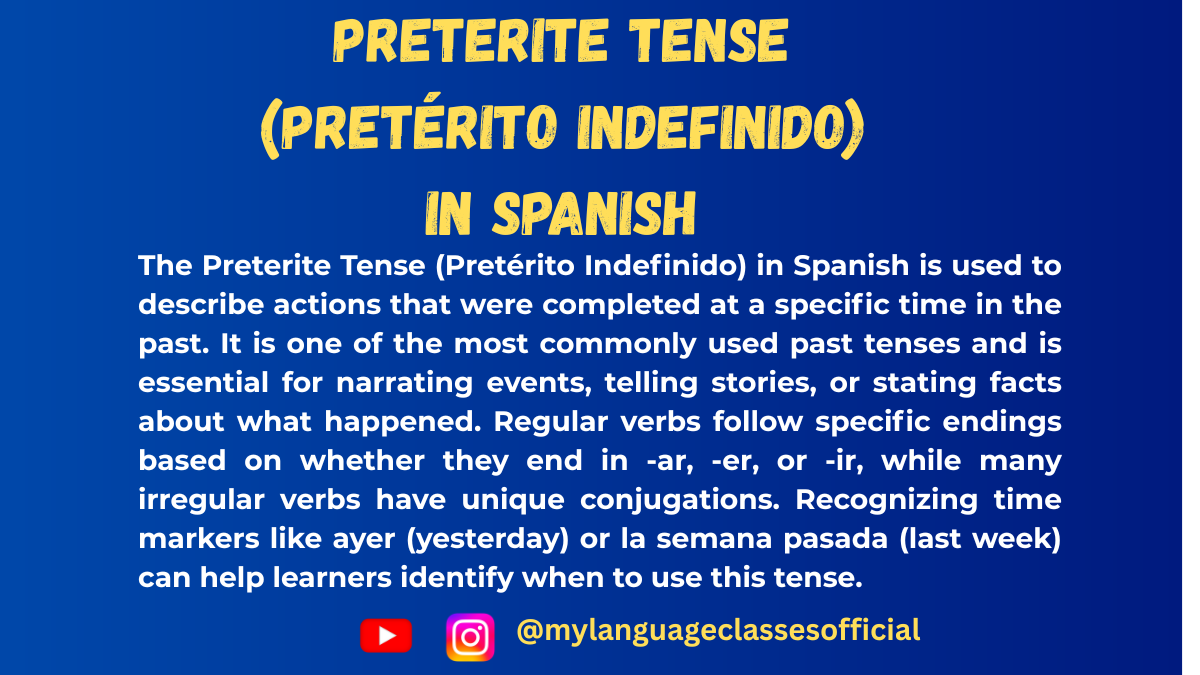Your cart is currently empty!
Tag: tips for learning Spanish grammar
-

Preterite Tense (Pretérito Indefinido) in Spanish
The Preterite tense, or Pretérito Indefinido, is one of the most common past tenses in Spanish. It’s primarily used to describe actions that were completed in the past. In this blog, we will dive deep into understanding its usage, formation, and some practical expressions to help you speak like a native.
When to Use the Preterite Tense
The Preterite is used in several specific situations:
- Completed actions in the past
Actions that are seen as finished and are not ongoing.
Example:- Ayer leí un libro. (Yesterday I read a book.)
- Actions with a clear beginning or end
Events that started and ended at a specific time.
Example:- Llegué a casa a las 8. (I arrived home at 8.)
- Sequential actions
Events that happened one after the other.
Example:- Me levanté, me duché y salí a correr. (I got up, showered, and went for a run.)
- Interrupting actions
When one action interrupts another ongoing action.
Example:- Estudiaba cuando sonó el teléfono. (I was studying when the phone rang.)
Forming the Preterite Tense
The Preterite tense has different conjugation rules for -AR, -ER, and -IR regular verbs.
Regular Verb Conjugation
- -AR Verbs
Replace the infinitive ending-arwith:- é, aste, ó, amos, asteis, aron
- Yo hablé (I spoke)
- Tú hablaste (You spoke)
- Él/Ella/Usted habló (He/She/You spoke)
- Nosotros/as hablamos (We spoke)
- Vosotros/as hablasteis (You all spoke)
- Ellos/Ellas/Ustedes hablaron (They/You all spoke)
- -ER Verbs
Replace the infinitive ending-erwith:- í, iste, ió, imos, isteis, ieron
- Yo comí (I ate)
- Tú comiste (You ate)
- Él/Ella/Usted comió (He/She/You ate)
- Nosotros/as comimos (We ate)
- Vosotros/as comisteis (You all ate)
- Ellos/Ellas/Ustedes comieron (They/You all ate)
- -IR Verbs
Replace the infinitive ending-irwith the same endings as-erverbs:- í, iste, ió, imos, isteis, ieron
- Yo viví (I lived)
- Tú viviste (You lived)
- Él/Ella/Usted vivió (He/She/You lived)
- Nosotros/as vivimos (We lived)
- Vosotros/as vivisteis (You all lived)
- Ellos/Ellas/Ustedes vivieron (They/You all lived)
Common Irregular Verbs in Preterite
Some verbs have irregular stems and endings in the Preterite. These do not follow the standard conjugation rules.
List of Common Irregular Verbs
- Ser/Ir (to be/to go): fui, fuiste, fue, fuimos, fuisteis, fueron
- Hacer (to do/make): hice, hiciste, hizo, hicimos, hicisteis, hicieron
- Estar (to be): estuve, estuviste, estuvo, estuvimos, estuvisteis, estuvieron
- Tener (to have): tuve, tuviste, tuvo, tuvimos, tuvisteis, tuvieron
- Poder (to be able to): pude, pudiste, pudo, pudimos, pudisteis, pudieron
- Decir (to say): dije, dijiste, dijo, dijimos, dijisteis, dijeron
Common Expressions with Preterite Tense
Here’s a list of expressions often used with the Preterite tense, along with their meanings and examples:
- Ayer (Yesterday)
- Example: Ayer fuimos al cine. (Yesterday we went to the cinema.)
- Anoche (Last night)
- Example: Anoche cené con mis amigos. (Last night I had dinner with my friends.)
- El año pasado (Last year)
- Example: El año pasado viajé a España. (Last year I traveled to Spain.)
- Hace un mes (A month ago)
- Example: Hace un mes terminé el curso. (A month ago I finished the course.)
- La semana pasada (Last week)
- Example: La semana pasada trabajé mucho. (Last week I worked a lot.)
- De repente (Suddenly)
- Example: De repente empezó a llover. (Suddenly it started to rain.)
- Una vez (Once)
- Example: Una vez conocí a un famoso. (Once I met a celebrity.)
Things to Keep in Mind
- Gender and Plurality
While verbs in the Preterite tense are not affected by gender or plurality, the articles and adjectives around them should agree with the noun.- Example:
- El niño habló. (The boy spoke.)
- La niña habló. (The girl spoke.)
- Example:
- Irregularities and Spelling Changes
- Verbs ending in
-car,-gar, and-zarhave spelling changes in the yo form:- Buscar → busqué
- Pagar → pagué
- Almorzar → almorcé
- Verbs ending in
- Pronunciation Tips
- Stress is crucial in the Preterite tense. For example:
- Caminó (He/She walked) vs. Camino (Road).
- Stress is crucial in the Preterite tense. For example:
Practice Makes Perfect!
Learning the Preterite tense requires practice. Try forming sentences using both regular and irregular verbs. Use the common expressions listed above to describe past events, and soon, you’ll find it much easier to recall these forms naturally.
If you enjoyed this lesson, be sure to check out more posts like this on my blog at My Language Classes. Don’t forget to subscribe my YouTube channel and follow me on Instagram for the latest language learning tips and lessons. Leave a comment below to share your thoughts, or ask any questions you have.
Happy learning! 😊
- Completed actions in the past
